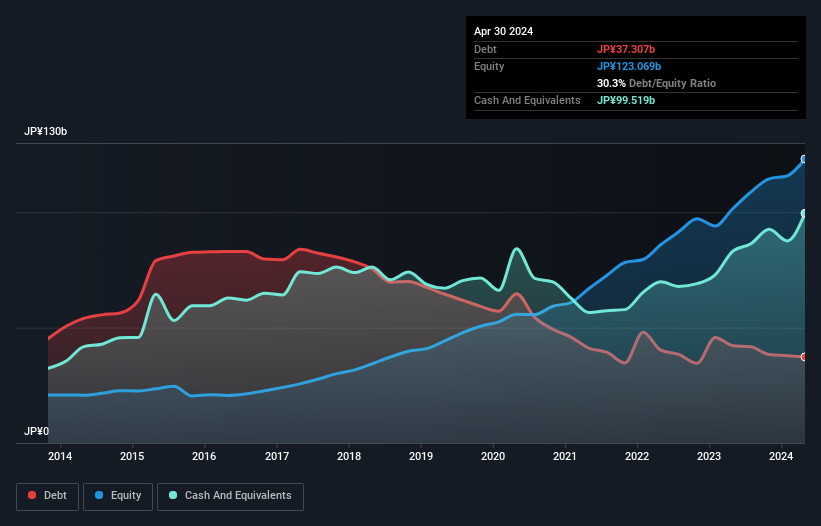
Some say volatility, rather than debt, is the best way to think about risk as an investor, but Warren Buffett famously said that 'Volatility is far from synonymous with risk.' So it seems the smart money knows that debt - which is usually involved in bankruptcies - is a very important factor, when you assess how risky a company is. Importantly, Kobe Bussan Co., Ltd. (TSE:3038) does carry debt. But the more important question is: how much risk is that debt creating?
What Risk Does Debt Bring?
Debt assists a business until the business has trouble paying it off, either with new capital or with free cash flow. Ultimately, if the company can't fulfill its legal obligations to repay debt, shareholders could walk away with nothing. While that is not too common, we often do see indebted companies permanently diluting shareholders because lenders force them to raise capital at a distressed price. By replacing dilution, though, debt can be an extremely good tool for businesses that need capital to invest in growth at high rates of return. When we think about a company's use of debt, we first look at cash and debt together.
See our latest analysis for Kobe Bussan
What Is Kobe Bussan's Net Debt?
As you can see below, Kobe Bussan had JP¥37.3b of debt at April 2024, down from JP¥42.1b a year prior. However, it does have JP¥99.5b in cash offsetting this, leading to net cash of JP¥62.2b.

A Look At Kobe Bussan's Liabilities
According to the last reported balance sheet, Kobe Bussan had liabilities of JP¥52.2b due within 12 months, and liabilities of JP¥46.9b due beyond 12 months. Offsetting these obligations, it had cash of JP¥99.5b as well as receivables valued at JP¥26.9b due within 12 months. So it can boast JP¥27.3b more liquid assets than total liabilities.
This short term liquidity is a sign that Kobe Bussan could probably pay off its debt with ease, as its balance sheet is far from stretched. Simply put, the fact that Kobe Bussan has more cash than debt is arguably a good indication that it can manage its debt safely.
Another good sign is that Kobe Bussan has been able to increase its EBIT by 25% in twelve months, making it easier to pay down debt. There's no doubt that we learn most about debt from the balance sheet. But ultimately the future profitability of the business will decide if Kobe Bussan can strengthen its balance sheet over time. So if you're focused on the future you can check out this free report showing analyst profit forecasts.
Finally, while the tax-man may adore accounting profits, lenders only accept cold hard cash. While Kobe Bussan has net cash on its balance sheet, it's still worth taking a look at its ability to convert earnings before interest and tax (EBIT) to free cash flow, to help us understand how quickly it is building (or eroding) that cash balance. Over the most recent three years, Kobe Bussan recorded free cash flow worth 54% of its EBIT, which is around normal, given free cash flow excludes interest and tax. This free cash flow puts the company in a good position to pay down debt, when appropriate.
Summing Up
While it is always sensible to investigate a company's debt, in this case Kobe Bussan has JP¥62.2b in net cash and a decent-looking balance sheet. And we liked the look of last year's 25% year-on-year EBIT growth. So we don't think Kobe Bussan's use of debt is risky. Above most other metrics, we think its important to track how fast earnings per share is growing, if at all. If you've also come to that realization, you're in luck, because today you can view this interactive graph of Kobe Bussan's earnings per share history for free.
If, after all that, you're more interested in a fast growing company with a rock-solid balance sheet, then check out our list of net cash growth stocks without delay.
Valuation is complex, but we're here to simplify it.
Discover if Kobe Bussan might be undervalued or overvalued with our detailed analysis, featuring fair value estimates, potential risks, dividends, insider trades, and its financial condition.
Access Free AnalysisHave feedback on this article? Concerned about the content? Get in touch with us directly. Alternatively, email editorial-team (at) simplywallst.com.
This article by Simply Wall St is general in nature. We provide commentary based on historical data and analyst forecasts only using an unbiased methodology and our articles are not intended to be financial advice. It does not constitute a recommendation to buy or sell any stock, and does not take account of your objectives, or your financial situation. We aim to bring you long-term focused analysis driven by fundamental data. Note that our analysis may not factor in the latest price-sensitive company announcements or qualitative material. Simply Wall St has no position in any stocks mentioned.
About TSE:3038
Kobe Bussan
Primarily engages in the operation, management, and franchising of retail stores in Japan.
Flawless balance sheet with moderate growth potential.
Market Insights
Community Narratives




